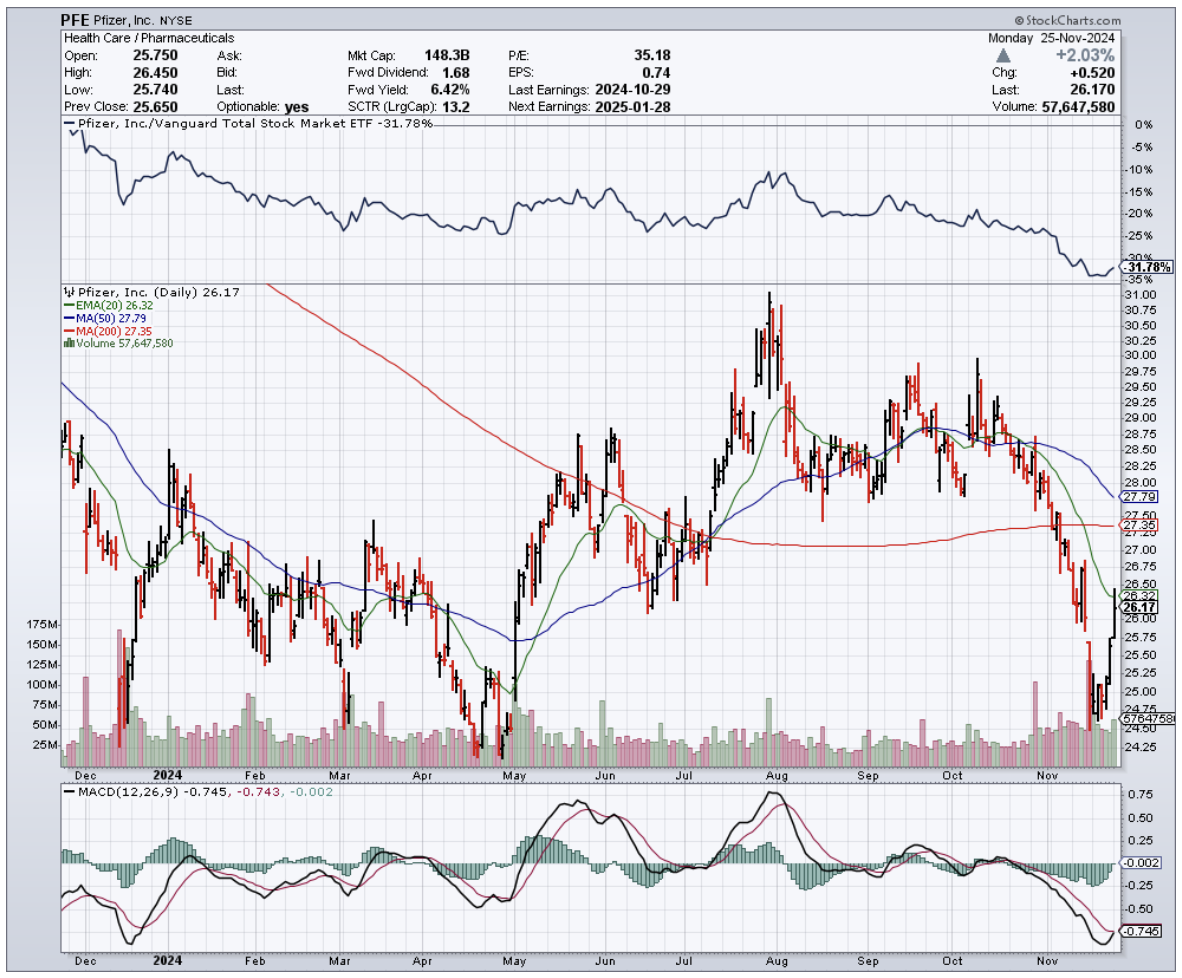No More Eating At You
In 1903, the original “diet miracle” was invented—tapeworm pills. Yes, people willingly ingested parasites to lose weight.
Thankfully, modern weight-loss drugs have evolved to become a bit more... palatable. Enter Pfizer (PFE), taking the pharmaceutical stage in Q3 2024 with a performance that’s anything but parasitic.
Pfizer just reported a stunning $17.7 billion in Q3 2024 revenue—a 31% year-over-year increase that has nothing to do with parasites and everything to do with strategic positioning.
But here's where it gets interesting. Even if you strip away Pfizer's COVID-19 products (which, let's face it, had their moment like platform shoes in the '70s), they're still sitting pretty with $13.6 billion in revenue.
That's a 14% operational increase that has nothing to do with our old friend coronavirus.
Meanwhile, in the weight-loss corner of the ring, Eli Lilly (LLY) and Novo Nordisk (NVO) are experiencing what we might delicately call "growing pains."
Eli Lilly reported $11.44 billion in Q3 revenue—impressive until you consider analysts expected $12.18 billion.
Novo Nordisk's story is even more peculiar. Their weight-loss wonder drug Wegovy is selling like hotcakes (irony noted) at 17.3 billion Danish krone (about $2.75 billion USD).
But here's the catch: Novo Nordisk can't make enough of it. It's the pharmaceutical equivalent of having a hit restaurant where half the menu items are perpetually "sold out."
This shortage highlights just how insatiable the market's appetite for these drugs has become.
In 2023 alone, the US market for prescription weight-loss drugs more than doubled from $5.1 billion to $11.9 billion.
Gone are the days of dubious diet pills and miracle cures. We're witnessing the dawn of scientifically backed weight management solutions.
As for Pfizer, they’re not content to watch from the sidelines. They're developing something called danuglipron (a name that sounds like it was conceived during a particularly intense game of Scrabble). It's an oral weight-loss drug currently in Phase 2B trials.
Danuglipron’s key selling point? It's an oral medication—no needles required.
As someone who once spent three months investigating the science of injection phobia for a story, I can confirm this detail matters more than you might think.
Pfizer’s plans go beyond just one drug. In the first 9 months of 2024, they invested $7.8 billion in R&D.
Their recent acquisition of Seagen has already contributed $854 million in Q3 2024 revenue, proving that their strategy of buying innovation is paying off.
In fact, they're so confident about their trajectory that they've raised their full-year 2024 revenue guidance to between $61 billion and $64 billion.
But let's talk about the elephant in the pharmacy – regulatory approval. The FDA, bless their bureaucratic hearts, has been keeping everyone on their toes with their evolving stance on weight-loss drugs and other treatments.
Still, Pfizer managed to snag approvals for two new drugs in October 2024: Abrysvo (for RSV in adults) and Hympavzi (for hemophilia).
Both approvals came through in October 2024, showing off Pfizer’s ability to navigate modern pharmaceutical regulations.
Looking globally, the weight loss and obesity management market is projected to grow from $14.51 billion in 2024 to $48.39 billion by 2034.
Of course, no good pharma story is complete without a plot twist. Pfizer's oncology drug Ibrance saw a 12% operational decrease in Q3 2024 revenue, reminding us that even pharmaceutical juggernauts can stub their toes.
And those patents? They're like time bombs ticking away in the legal department's filing cabinet.
The obesity field is attracting new players, too. Amgen (AMGN) is developing MariTide, while Rhythm Pharmaceuticals (RYTM) focuses on genetic obesity disorders.
Altimmune's (ALT) pemvidutide is showing promising Phase 2 results, adding to the increasingly crowded field of weight-loss treatments.
So, where should you park your money? Here’s a quick guide to the stocks worth scooping up when the market takes a breather.
Novo Nordisk remains the heavyweight champion of weight-loss drugs, with Wegovy and Ozempic bringing in the big bucks. Yes, they're wrestling with production issues, but their first-mover advantage and global reach make them a solid buy for the long haul.
Eli Lilly, with Mounjaro and the freshly minted Zepbound, deserves a spot in your portfolio too. Their supply chain headaches are likely temporary, and their pipeline is bursting with potential.
Pfizer, our surprising comeback kid, rounds out the list. They might be fashionably late to the weight-loss party, but their diversification strategy and that promising GLP-1 pill in development make them worth your investment dollars. Plus, their global reach could give them an edge against their competitors.
On the hold list, we’ve got Amgen and Rhythm Pharmaceuticals—stocks you might want to keep an eye on but not necessarily dive into headfirst just yet.
Amgen's MariTide shows promise, but they're playing in a very crowded pool. Rhythm's focus on genetic obesity disorders is fascinating, but they're like a promising indie band - they might hit it big, or they might not.
As for Altimmune and Viking Therapeutics? Sometimes you need to know when to fold 'em. Despite promising early results, they're up against giants with deeper pockets and better-established supply chains.
Unless you enjoy roller coasters without safety bars, consider redirecting those investment dollars elsewhere.
Looking back, we've come an astonishingly long way from those desperate days of tapeworm pills—turns out the real money wasn't in selling parasites, but in pioneering their prescription-strength replacements.
And that's the kind of progress that would make those 1903 tapeworm salesmen drop their jaws (and hopefully nothing else).

